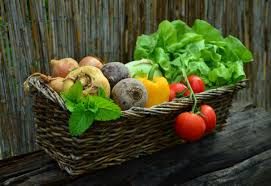5 Easy Steps To Start Your Own Organic Gardening Today
If you have been putting off starting your own organic garden because it all sounds too hard, or because you don't understand what's involved, then put it off no longer.
Here are the 5 basic steps you need to take to get your organic garden off and running today.
Just remember the benefits. Growing your own herbs, vegetables, greens and fruit can be both incredibly rewarding and delicious.
However, many gardeners rely on pesticides, herbicides and fungicides not to mention chemical fertilizers to help their garden grow.
That’s not only unnecessary, it’s also unhealthy.
All those nutritious veggies pack a much healthier punch if they’re sans harmful chemicals.
Step #1 Prepare your soil.
Because your soil is the foundation of your garden, it is important to make sure it’s full of the right nutrients to feed your garden.
Mix in organic material like compost or humus and consider having your soil tested.
The proper soil conditions can make the difference between a sparse crop and award winning vegetables.
Step #2 Choose your crop.
The second step to build an organic garden is to choose your crop.
What are you going to grow in your garden?
Initially, in addition to what you’re going to grow, you’ll want to decide if you want to purchase plants or start your garden from seeds.
If you start early enough you can use seeds. If not, you can purchase organic plants from your local nursery.
Regardless of what you choose, seeds or plants, make sure they’re grown without chemicals.
Step #3 Organize your garden.
Did you know some plants naturally protect other plants from disease and pests? It’s true.
Marigolds for example, drive bugs away and if you plant them around the perimeter of your garden, they’ll help protect your herbs, greens and veggies.
Before transferring your plants into your garden, mark where you’re going to plant them.
Make sure there is plenty of room between plants so they have room to grow and thrive.
A tiny tomato plant can grow several feet high and several feet wide. Leave room.
Step #4 Natural pesticides, herbicides and fungicides.
It’s been said that home gardeners generally use more chemicals on their gardens than farmers do.
That’s a lot of chemicals! Interestingly enough, mild detergent and water protect many plants from harmful pests.
Hot pepper sprays also work to fend off pests.
And natural predators like frogs and ladybugs can keep your garden healthy and full.
Step #5 Maintenance.
Watering and weeding are all you have in store for you until it’s time to harvest.
Take care to not over water.
Soil should be moist but not soaking.
Weed on a regular basis to make sure your plants have all the nutrients and room in the soil they need to grow.
Organic gardening isn’t difficult when you start with a healthy foundation.
Before you dive in and start a garden large enough to feed an army, choose a few plants you know your family will eat.
Grow those successfully and next year you can grow a bigger garden.
------------------------------------------------------------------------------------
Neil Smith has written extensively on life (and how to deal with it) including 3 non-fiction books and numerous blogs. To read more about his books CLICK HERE and one of his favourite blogs 'How To Be Human' CLICK HERE. See other blogs in the sidebar.
------------------------------------------------------------------------------------
